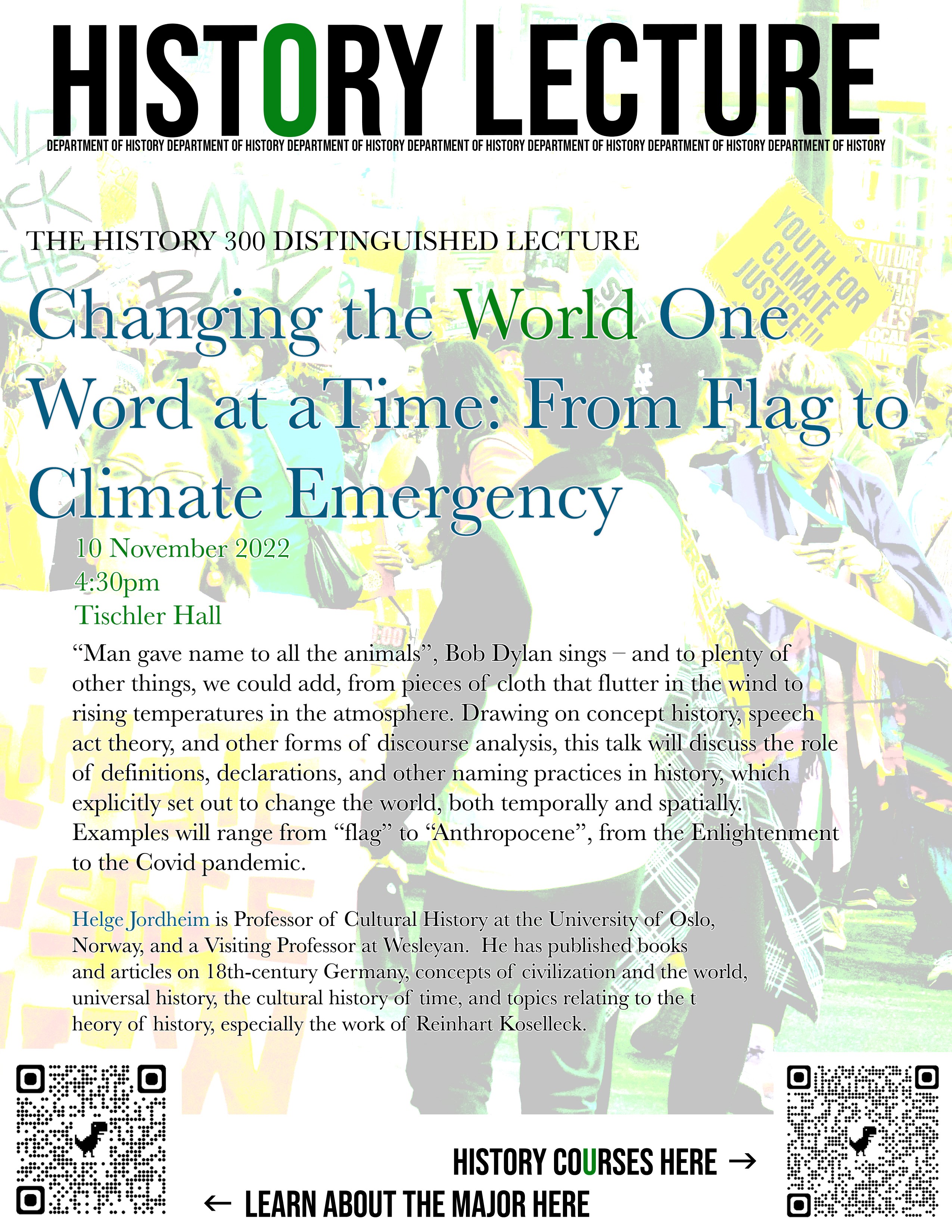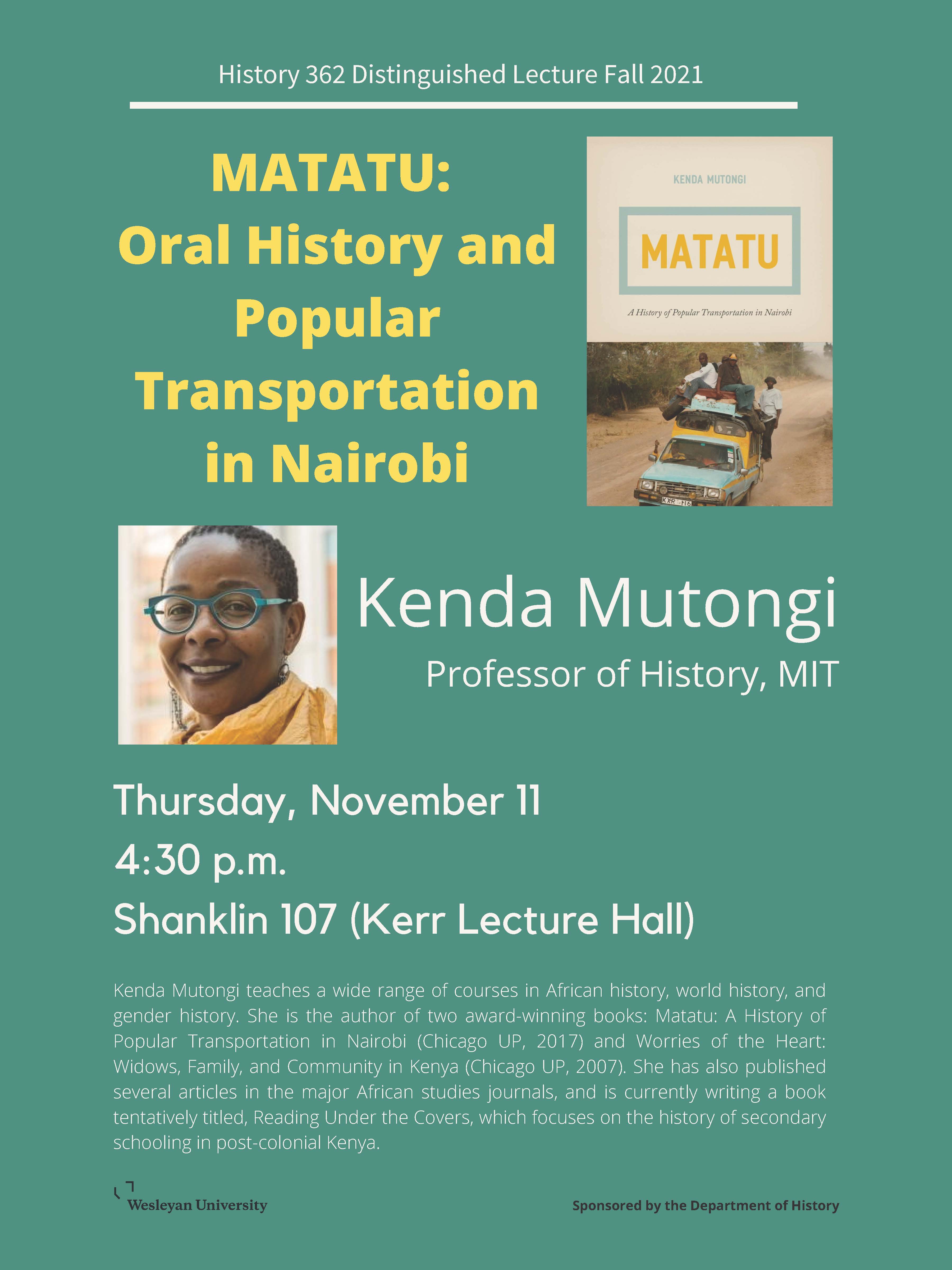-

Changing the World One Word at a Time: From Flag to Climate Emergency
Thursday, November 10, 2022
Helge Jordheim delivers the Fall 2022 History 300 Distinguished Lecture. Helge Jordheim is Professor of Cultural History at the University of Oslo, Norway, and a Visiting Professor at Wesleyan. He has published books and articles on 18th-century Germany, concepts of civilization and the world, universal history, the cultural history of time, and topics related to the theory of history, especially the work of Reinhart Koselleck.
Read More about this talk“Man gave name to all the animals”, Bob Dylan sings – and to plenty of other things, we could add, from pieces of cloth that flutter in the wind to rising temperatures in the atmosphere. Drawing on concept history, speech act theory, and other forms of discourse analysis, this talk will discuss the role of definitions, declarations, and other naming practices in history, which explicitly set out to change the world, both temporally and spatially. Examples will range from “flag” to Anthropocene”, from Enlightenment to the Covid pandemic. -

MATATU: Oral History and Popular Transportation in Nairobi (Fall 2021)
Kenda Mutongi, Professor of History at MIT, teaches a wide range of courses in African history, world history, and gender history. She is the author of two award-winning books: Matatu: A History of Popular Transportation in Nairobi (Chicago UP, 2017) and Worries of the Heart: Widows, Family, and Community in Kenya (Chicago UP, 2007). She has also published several articles in the major African studies journals, and is currently writing a book tentatively titled, Reading Under the Covers, which focuses on the history of secondary schooling in post-colonial Kenya. -

Nature and the Writing of History (2019)
Prasannan Parthasarathi, Professor of Modern South Asian History at Boston College Since the 1960s, new perspectives—ranging from social history to the gender, post-colonial and linguistic turns—have reshaped the writing of history. The environmental turn, however, has failed to have a similar impact. This lecture explores why and argues for an approach that puts nature at the heart of our historical narratives.
Read MorePrasannan Parthasarathi is Professor of Modern South Asian History at Boston College. He is the author of The Transition to a Colonial Economy: Weavers, Merchants and Kings in South India, 1720-1800 (Cambridge, 2001), The Spinning World: A Global History of Cotton Textiles (Oxford, 2009), and Why Europe Grew Rich and Asia Did Not: Global Economic Divergence 1600-1850 (Cambridge, 2011), which received the Jerry Bentley Book Prize of the World History Association and was named a Choice magazine outstanding academic title. He is now working on a study of agriculture, environment and labor in nineteenth-century Tamilnad. His articles have appeared in Past and Present, The Journal of Social History, International Labor and Working Class History, and Modern Asian Studies. He serves on the editorial boards of International Labor and Working Class History, The Journal of Social History, The Journal of World History, Textile History, and The Medieval History Journal. His research has been supported by the Radcliffe Institute for Advanced Study, the American Council of Learned Societies, and the Dibner Institute for the History of Science and Technology.
Wednesday | October 2, 2019
4:30 p.m. | PAC 001
SPONSORED BY THE DEPARTMENT OF HISTORY -

BREXIT and the British Constitution (2018)
Linda Colley, Shelby M.C. Davis 1958 Professor of History Princeton University
Read MoreBritain's current crisis over BREXIT is not just a function of its political divisions and of the populist surge that is presently affecting Europe and parts of Asia as well as the USA. It also rejects deeper and longer constitutional and national uncertainties and histories. In this lecture, Linda Colley explores what these are, and how they have evolved, and she discusses how far this present trauma may lead to changes in Britain's supposedly "unwritten constitution."
Thursday, November 8, 2018
4:30 p.m.
Russell HouseSponsored by the History Department
-

The Great Force of History: White Innocence, Historical Justice, and Making Black Lives Matter (2017)
Renee C. Romano is the Robert S. Danforth Professor of History and Professor of Comparative American Studies and Africana Studies at Oberlin College.Read MoreAs the need for the Black Lives Matter movement and reams of economic and sociological data make clear, racial inequalities in the United States remain deep and pervasive. Yet many white Americans today believe that they, not people of color, are the primary victims of racism, and many refuse to acknowledge any responsibility for slavery or other historical acts of oppression. This talk explores what James Baldwin calls “white innocence” and black philosopher Charles Mills terms the “epistemology of ignorance,” or namely the willful ignorance of many white Americans about the depth and extent of racism and racial violence in the nation’s history. Drawing on scholarly literature about the consequences of historical injustice and the possibilities for historical redress, the lecture will explore the phenomenon of white innocence as a consequence of unresolved historical injustice and will consider whether common mechanisms of redress such as trials, truth commissions, and commemorative practices could play a role in fostering a less racially divided United States.
Renee C. Romano is the Robert S. Danforth Professor of History and Professor of Comparative American Studies and Africana Studies at Oberlin College. Her work explores issues of race and historical memory in America’s recent past. She is the author of Race Mixing: Black-White Marriage in Postwar America (Harvard University Press, 2003) and Racial Reckoning: Prosecuting America’s Civil Rights Murders (Harvard University Press, 2014), as well as co-editor of the collections, The Civil Rights Movement in American Memory (with Leigh Raiford, University of Georgia Press, 2006) and Doing Recent History: On Privacy, Copyright, Video Games, Institutional Review Boards, Activist Scholarship, and History that Talks Back (with Claire Potter, University of Georgia Press, 2012). Her next book, a collection co-edited with Claire Potter about the musical Hamilton, will be published by Rutgers University Press in early 2018.Sponsored by the History Department
-

Making Money Speak: Coin Hoards as Sources of Social and Economic History (2016)
Phillip B. Wagoner, Professor of Art History and Archaeology, Wesleyan University.
Read MorePhillip B. Wagoner’s research focuses on the cultural history of the Deccan region of South India, primarily in the late medieval and early modern periods (1200-1600). His primary interest is in the historical interactions between the region’s established Indic culture and the Persianate culture that arrived when the Delhi Sultanate annexed the region in the early fourteenth century.
Sponsored by the History Department
-

Negro Cloth: Plantation Provisioning and New England's Industrial Revolution (2015)
Seth Rockman, Associate Professor of History, Brown University.
Read MoreProfessor Rockman considers the market research and product design that allowed New England villages to dominate the market for slave clothing in Antebellum America. This story of entrepreneurship and innovation is also one of moral complicity with implications for the present-day relationship of far-flung producers and consumers. Rockman has taught at Brown University since 2004 and studies the relationship of slavery and capitalism in the United States. He is the author of Scraping By: Wage Labor, Slavery, and Survival in Early Baltimore.
Sponsored by the History Department
-

Humans and Things: In a Deep Historical Persepective (2014)
Danile Lord Smail, Professor of History at Harvard University.
Read MoreHumans have been making things since, well, we became human. In the relationship between humans and things, who is the master and who is the slave? For Professor Smail, the question has particular relevance in a world marked by a warming climate and environmental degradation. In this lecture, he will offer deep historical perspectives on one of the most burning questions of our time. Professor Smail’s research concentrates on deep human history and the history and anthropology of Mediterranean societies between 1100 and 1600. He currently studies transformations in the material culture of later medieval Mediterranean Europe using household inventories and inventories of debt recovery from Lucca and Marseille.
Sponsored by the History Department -

‘Leo Africanus’ Discovers Comedy: A Mediterranean Adventure (2013)
Natalie Zemon Davis, Henry Charles Lea Professor of History Emerita, Princeton University.
Read MoreThis talk stages a dialogue between two theatrical traditions at the end of the Middle Ages: the popular theater of the Arabic and Islamic world and the theater of Christian Europe. It does so through the adventures of Hasan al-Wazzan (“Leo Africanus”), a Moroccan traveler and diplomat, who was captured by Christian pirates in 1518 and spent several years in Italy as a seeming convert before returning to North Africa. The talk reflects on possible limits to cultural exchange and on the continuing vigor of alternate cultural traditions.
Natalie Zemon Davis has received honorary degrees from numerous universities in the United States and Europe. In 1987 she served as President of the American Historical Association. In recognition of her path breaking historical work, in 2010 she was awarded the Holberg International Memorial Prize, and in 2012 she received the National Humanities Medal.
Sponsored by the History Department -

Seeing Past History as Usual: On Using Visual Evidence (2012)
Vanessa Schwartz, Professor of History, Art History and Film, USC.
Read MoreVanessa Schwartz is professor of history, art history and film and the former director of the Visual Studies Graduate Certificate at the University of Southern California. The author of Modern France: A Very Short Introduction (2011), It’s So French! Hollywood, Paris and the Making of Cosmopolitan Film Culture (2007) and Spectacular Realities: Early Mass Culture in Fin-de-siècle Paris (1998), as well as co-editor of Cinema and the Invention of Modern Life (1995) and The Nineteenth Century Visual Culture Reader (2004), she is now writing a history of the “Jet Age.”
Sponsored by the History Department -

The kaleidoscope of Empire: Reflections on Transcontinental Lives (2010)
The kaleidoscope of Empire: Reflections on Transcontinental Lives (2010) Read MoreProfessor Jasanoff will draw on her past and current work to discuss new directions in the writing of world history, particularly the challenges that confront the historian of empire when piecing together complex individual lives. She is the author of Edge of Empire: Lives, Culture, and Conquest in the East, 1750–1850 and the forthcoming Liberty’s Exiles: American Loyalists in the Revolutionary World.
Sponsored by the History Department -

BEYOND THE BOUNDARIES: Fields, Methods, Sources, and Questions in Atlantic History
James H. Sweet, Professor of History, University of Wisconsin.
Read MoreProfessor Sweet will discuss his AHR article that draws together Domingos Alvares (Africa/Latin America) with Olaudah Equiano (Africa/British American), explaining how he came to the realization that Alvares' trajectory might add to the well-worn debates about Equiano. How could an Afro-Portuguese story tell us something about an Afro-British story and vice versa? This will lead to a discussion of broader issues of methodology--how one approaches sources, the kinds of questions one asks of the sources, etc. Then Sweet will pan out and examine some broader “macro” questions related to the positive benefits of mastering a historical "field," but also the possible limitations of that narrow mastery. James Sweet’s research and teaching center on Africans and their descendants in the broader world. He teaches courses on comparative slavery, race and nation in the Atlantic world, comparative world history, the history of Brazil, and the history of South Africa. His research has concentrated on the social and cultural histories of Africans in the Atlantic world. His next book will focus on the international dimensions of slavery in the United States, and he has begun several research projects related to South Africa.
Sponsored by the History Department
Professor Sweet’s website: http://history.wisc.edu/people/faculty/sweet.htm
